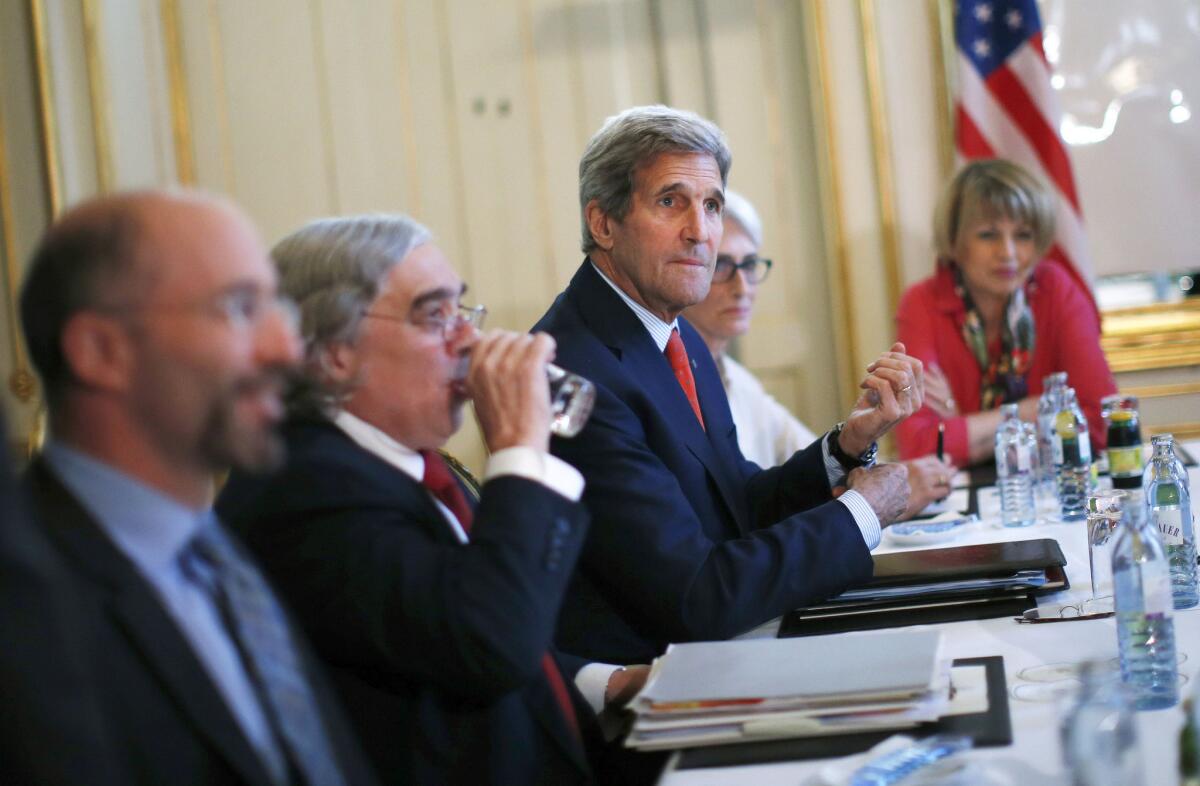Negotiators make headway on Iran sanctions, past nuclear activity

Secretary of State John F. Kerry, center, during nuclear talks with the Iranian foreign minister in Vienna on Friday.
Reporting from Vienna — The head of the United Nations’ nuclear watchdog agency said Saturday he hopes to complete his controversial investigation of Iran’s past nuclear activities by December, potentially removing a key obstacle to completion of world powers’ sweeping nuclear deal with the Islamic Republic.
Meanwhile, diplomats said there has also been progress on another disputed issue in the negotiations, the sanctions relief that Iran will receive as part of the deal. Negotiators reached a tentative agreement on the structure and schedule for sanctions relief, though more work and a high-level blessing is needed, officials said.
“If and when issues get resolved at an experts level, there will remain some open issues that can only be decided by ministers,” a senior Obama administration official said. Negotiators “still have a bunch of work to do” on the sanctions issue, added the official, who would not be named while the discussions were still in progress.
Diplomats have also reached tentative agreement on a mechanism to restore suspended sanctions if Iran is found to be violating the agreement. U.S. officials consider this “snapback” essential and have pressed to avoid allowing a small number of countries to block it from happening.
Under the proposed arrangement, a panel made up of the six countries and Iran would examine any assertions that Iran is not living up to it obligations. The U.N. Security Council would periodically adopt a resolution rolling over suspension of the sanctions.
But if a council member believed Iran to be in violation of the rules, it could prevent the rollover and reinstate the sanctions, officials say.
The United States and five other world powers -- France, Britain, Germany, Russia and China -- are seeking a deal that would ease sanctions on Iran if it agrees to steps intended to keep it from obtaining a bomb for 10 to 15 years. Negotiators for the group have been working in Vienna for the past week, toward a self-imposed deadline of Tuesday.
Yukiya Amano, director general of the International Atomic Energy Agency, told reporters he hopes to complete the IAEA’s probe of Iran’s past activities if Iran cooperates in answering outstanding questions on past work, such as research on nuclear bomb related equipment.
“With the cooperation from Iran, I think we can issue a report by the end of the year on the assessment of the clarification of the issues related to possible military dimensions,” he said.
Amano visited Tehran on Thursday and held meetings that top Iranian officials said had yielded progress toward resolving the long-running investigation.
Kelsey Davenport, of the Arms Control Assn., said the comments were “a very significant development” for the IAEA’s investigation and for completion of the nuclear deal, which may happen in days.
The nuclear agency has been seeking to establish the facts on a variety of suspected past nuclear activities, including experiments with bomb detonators. The IAEA considers the probe crucial because the information will help monitor Iran’s risky nuclear activities in the future, and to deter other countries from trying to break nuclear rules.
Iran insists that it has never sought a nuclear weapon. And it has been concerned that the agency would continue extending its investigation indefinitely.
Iran could still balk at providing all the information the IAEA is seeking.
But Davenport said Iran now has a strong incentive to cooperate. Doing so will ensure that it receives sanctions relief as part of the broader deal, she said. And since the deal is in view, Iranian officials can have confidence that the major powers won’t penalize them in the agreement, she said.
Ray Takeyh, an Iran specialist at the Council on Foreign Relations, who has been skeptical about the negotiations, said Amano’s plan may open the way for the agency to wrap up the investigation without getting all the answers it needs.
“The issue will not be resolved, but it will be passed over,” he predicted.
Special correspondent Ramin Mostaghim in Tehran contributed to this report.
More to Read
Sign up for Essential California
The most important California stories and recommendations in your inbox every morning.
You may occasionally receive promotional content from the Los Angeles Times.










